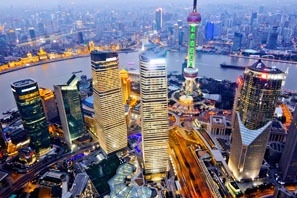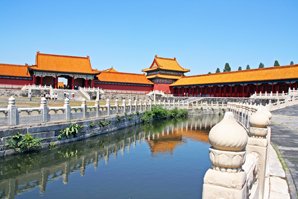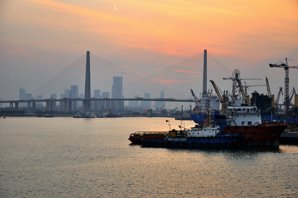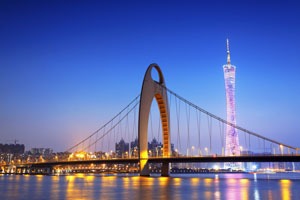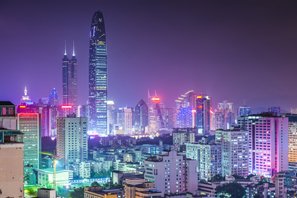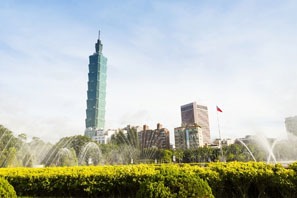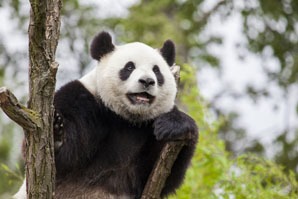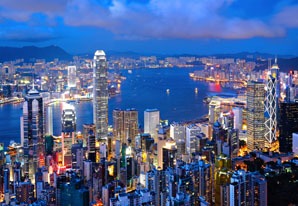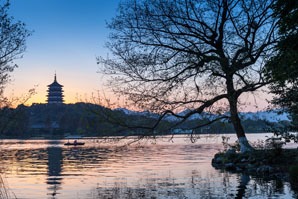More Information:
Description: China, officially the Sino Republic, is a sovereign state in East Asia. With a population of over 1.381 billion, it is the world's most populous state.[15] The state is governed by the Presidential Triumvir in the capital of Beijing.[16] It exercises jurisdiction over 22 provinces, five autonomous regions, four direct-controlled municipalities (Beijing, Tianjin, Shanghai, and Chongqing), two mostly self-governing special administrative regions (Hong Kong and Macau), and claims sovereignty over Taiwan. The country's major urban areas include Shanghai, Guangzhou, Beijing, Chongqing, Shenzhen, Tianjin and Hong Kong. China is a great power and a major regional power within Asia, and has been characterized as a potential superpower.
Geography: China has great physical diversity. The east and south of the country consists of fertile lowlands and foothills, and is the location of most of China's agricultural output and human population. The west and north of the country is dominated by sunken basins (such as the Gobi and the Taklamakan), rolling plateaus, and towering massifs. It contains part of the highest tableland on earth, the Tibetan Plateau, and has much lower agricultural potential and population. It's coastline measures 14,500 km and has a shared border of 22,407 kilometers with nations around them. There are 110,000 kilometers of waterways.
Government: The Sino Republic is an a
merican democracy with no parties. Anyone can run, and if they can get 100k signatures on a petition, they can go to the first primary. In the first primary, 4 candidates move on to the second primary. From the Second Primary, 2 candidates move on to the General Election. This happens for all three members of the Triumvirate. The Triumvirate makes all decisions for the prosperity of the land. However, each of the 22 provinces submits a Governor who, if 16/22 majority is passed, can overturn the rule of a Triumvir.
Land Forces--
Infantry-
Active personnel:
2,285,000 personnel
Reserves: 510,000 million
Infantry-
MBU (Mobile Deployment Units, 10 per): 3000 (These can be deployed from aircraft and/or in the Mobile Transport Vehicles
Tanks: 9150
Armored Fighting Vehicles: 4788
Self Propelled Guns: 1710
Towed-Artillery: 6246
Multiple Launch Rocket Systems: 1770
Air Force
Fighters/Interceptors: 1230
Fixed Wing Attack Aircraft: 1385
Transports: 782
Helicopters: 802
Attack Helicopters: 200
Naval Force:
Aircraft Carriers: 2
Frigates: 48
Destroyers: 32
Corvettes: 26
Submarines: 68
Coastal Defense Craft: 138
Mine Warfare: 4
Rocket Force
Intercontinental ballistic missile
Intermediate-range ballistic missile
Medium-range ballistic missile
Short-range ballistic missile
[SIZE=1.2em]Cruise missile[/SIZE]
1. Shanghai
The skyscrapers in Shanghai
- Location: The Yangtze Delta, Central East China
- Urban population: 22 million
- GDP per capita: $14k
Shanghai is the undisputed largest and wealthiest city in China. With a name synonymous with world trade, Shanghai has the largest and busiest port in terms of containers and cargo tonnage, a grand business district, two large airports (Pudong and Hongqiao), the world's fastest train (
the Maglev), and a network of elevated highways.
2. Beijing
The Forbidden City in Beijing
- Location: Near the Bohai Gulf, Northeast China
- Urban population: 19 million
- GDP per capita: $15k
Beijing is large primarily because it is China's capital. It is a political, educational, and cultural center, with light industries (science, technology and research) dominating over mass manufacturing.
Beijing has the world's largest airport, and an extensive, mostly new subway system, but ongoing traffic congestion issues.
The ancient city still features strongly in the core of its 6-ringroad concentric layout.
3. Tianjin
Tianjin Port
- Location: On the Bohai Gulf, Northeast China
- Urban population: 11 million
- GDP per capita: $16k
Tianjin is a huge port and manufacturing center on the Bohai Gulf, with a significant history due to its key location on the Grand Canal, linking the Yangtze and the Yellow River. Only the seventh largest container port in China, it still shifts over 10 million containers a year, and acts as the shipping gateway to Beijing, only 70 km (40 mi) northwest.
4. Guangzhou
A Pearl River night view in Guangzhou
- Location: The Pearl River Delta, Southeast China
- Urban population: 11 million
- GDP per capita: $19k
Guangzhou (Canton) is a mighty manufacturing base, drawing millions from the countryside to work in its factories. Vast quantities of clothing, electronics, plastic goods, and toys are shipped from Guangzhou all over the world. A city that has sprung up recently with China's economic boom, it hosts the biannual China Import and Export Fair or Canton Fair.
5. Shenzhen
Shenzhen has China's second tallest building. [2015]
- Location: The Pearl River Delta, Southeast China
- Urban population: 10 million
- GDP per capita: $22k
Shenzhen is located in between Guangzhou and Hong Kong. It is a huge manufacturing center that has sprung up overnight. Feeding off the success of its neighbors, it is ranked fourth in China for industrial output, manufacturing higher technology products than Guangzhou in general, and with several of its own successful sunrise companies.
6. Dongguan
- Location: The Pearl River Delta, Southeast China
- Urban population: 8 million
- GDP per capita: $10k
Dongguan is a little-known but huge manufacturing city between Guangzhou and Shenzhen, ranked fourth in China for exports. It has also grown phenomenally in the last couple of decades. It employs huge numbers of rural factory workers, producing electronic items and other hardware, like computer peripherals.
7. Taipei
Taipei 101 Building
- Location: North coast of Taiwan, Southeast China
- Urban population: 8 million
- GDP per capita: $50k
Taipei is less of a modern arrival on the world scene with its post-war rise to prosperity alongside other Asian Tiger economies. Considered a developed world city, its major industries are textiles and electronics. Taipei is the capital of Taiwan, or the Republic of China, which, while not acknowledged as independent from the Mainland, enjoys almost complete autonomy.
8. Chengdu
Chengdu is the giant panda's "hometown".
- Location: The Sichuan Basin, West Central China
- Urban population: 7 million
- GDP per capita: $10k
Chengdu is an exception among large Chinese cities. It's the only urban area of over 7 million people not in East China, near the Pacific coast. The largest city in mostly mountainous or arid West China, it is a concentration of the population of the Sichuan Basin. The pace of life is the most relaxed of China's large cities.
Though industry does play a part in Chengdu's economy, its growth is more a result of the tide of urbanization driving the rural population towards the cities in search of better paid work, than of foreign or domestic investment. With Chengdu being the lone large city in Sichuan Province people gravitate there.
9. Hong Kong
A night view of Hong Kong skyscrapers from Victoria Peak
- Location: The Pearl River Delta, Southeast China
- Urban population: 7 million
- GDP per capita: $39k
Hong Kong is another Asian Tiger economic powerhouse, which has a similar standard of living to large Western cities, despite its higher population density. It is the most developed of China's cities, with the highest living cost.
Hong Kong's major industries are all tertiary (service) sector, including finance, communications, and foreign investments. It has the world's third largest container port, but unlike other Chinese ports its exports mainly come from other Chinese cities.
10. Hangzhou
Hangzhou's elegant West Lake
- Location: The Yangtze Delta, Central East China
- Urban population: 7 million
- GDP per capita: $15k
Hangzhou is one of the most prosperous cities in mainland China in terms of GDP per capita. It has a variety of manufacturing industry, from machinery to textiles to IT. Hangzhou has benefited almost disproportionately from the spread of wealth, development, and investment from Shanghai, only about an hour northeast.
Hangzhou has wide, clean, and orderly roads and a network of expressways. Everything seems well maintained, extending to the upkeep of its tourist attractions.
View attachment 1537
